COVID-19

Joint Center Recommendations in Stimulus Package & Judge Ketanji Brown Jackson: March 18 Joint Center Roundup
Biden Administration
Biden promises 100 million vaccines & stimulus checks: On Monday, President Biden promised to deliver 100 million vaccine doses and 100 million relief checks in the next 10 days. So far, 109 million vaccine doses have been administered in the U.S. (93 million under the Biden Administration and 16 million under the Trump Administration). Last month, Politico reported that only 5 percent of vaccine doses were administered to African Americans. In a February town hall, President Biden said ensuring African Americans have fair access to the vaccine is “a priority,” and committed to increase physical access to the vaccine in majority Black neighborhoods and “spend a billion dollars on public education to help people figure out how they can get in there.”
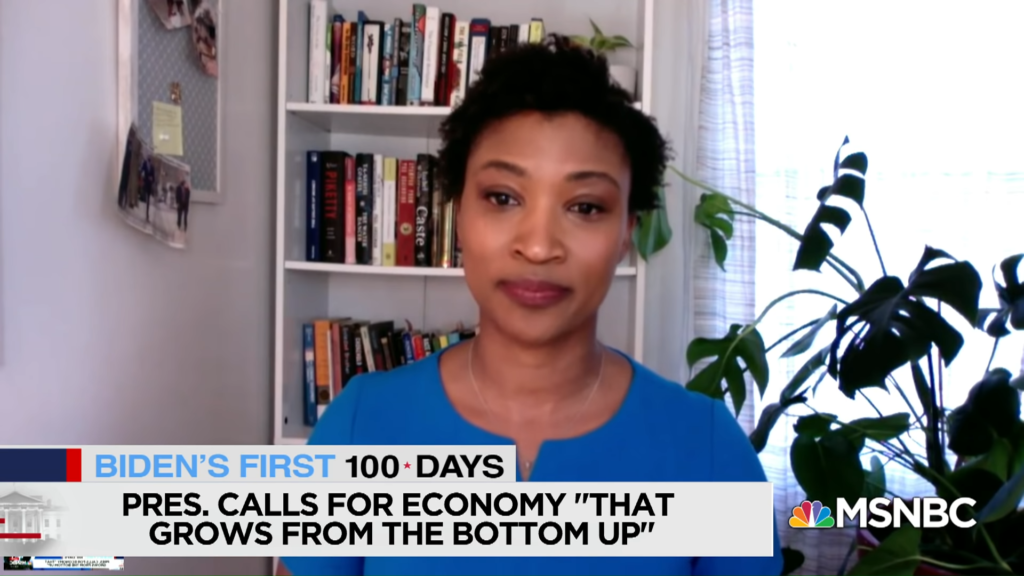
Joint Center recommendations included in the stimulus package: President Biden’s COVID-19 stimulus package that was passed and signed into law last week included several recommendations shared in the Joint Center’s 2020 report, Pandemic Relief Priorities for Black Communities. Some of our recommendations that appeared in the law include extending unemployment benefits, expanding the Child Tax Credit, ensuring minority depository institutions and community development financial institutions are involved in state programs such as the Paycheck Protection Program, and providing funding for schools and libraries to give free broadband service and connected devices. The $100 billion in aid to families with dependent children, including temporary changes to the tax code could cut the poverty rate for Black children from 24 percent to 11 percent. Four elements of the coronavirus stimulus package, including pandemic-related unemployment insurance benefits, could reduce the Black poverty rate by 42 percent. Overall, the measures would reduce poverty from a projected 13.7 percent to 8.7 percent in 2021, according to the Urban Institute. On Monday, Joint Center Vice President Jessica Fulton appeared on MSNBC to discuss the plan and how it might affect Black communities (pictured above). The COVID-19 relief package also includes stimulus checks of $1,400 per person, funding for COVID-19 vaccinations, fiscal support for states, tribes, and territories, and measures to help small businesses including a new $7.25 billion round of Paycheck Protection Program funding and $15 billion for a grant program for small businesses in Black and other underserved communities. A summary of the legislation can be found here, and the final legislation can be found here.
Vice President Kamala Harris and Black organizations stand up against anti-Asian hate and white supremacy: After the heinous hate crime in Georgia where eight people were killed including six Asian women, Vice President Kamala Harris said “we stand with you and understand how this has frightened and shocked and outraged all people” in a message to the Asian American community. Several Black organizations shared statements in solidarity with Asian communities: Black Futures Lab, Black Voters Matter, Color of Change, NAACP, and NAACP LDF. The Joint Center stands in solidarity with the Asian community, and against xenophobia and white supremacy.
Biden supports Senate filibuster reform: President Biden said he supports bringing back the “talking filibuster” where a Senator must continue talking in order to delay the vote on a bill. As ABC News notes, many Democrats are “worried that the filibuster could hold up major agenda items such as voting rights” and want to eliminate the filibuster or change the rules. However, experts also note that eliminating the filibuster may make it more difficult to stop bills that can harm Black communities in a different political environment.
Biden visits Black-owned business near Philly: During his first official visit as president to Philadelphia, President Biden visited Smith Flooring, a Black-owned flooring company in the Philadelphia suburbs. Between February and June 2020, Black-owned businesses declined 19 percent (compared to 5 percent for white-owned businesses). See also NBC News and WITF.
Treasury Department to do racial equity review: Treasury will move forward with a formal racial equity review of the agency and its programs. As the New York Times notes, “the review follows an executive order that President Biden signed in January requiring federal agencies to pursue racial equity and to support underserved communities in their policies and programming.”
The Hill
Majority Whip Clyburn pushes back on U.S. Senator Ron Johnson’s statement on Black Lives Matter: Senator Ron Johnson (R-WI) said he didn’t “feel threatened” by the insurrectionists who attacked Capitol Hill on January 6 which resulted in five deaths, but would be “a little concerned” if it were members of Black Lives Matter or antifa. Majority Whip Jim Clyburn (D-SC) called Senator Johnson “racist” and noted that “this is not the first time he has indicated such.”
Democrats consider bipartisan infrastructure legislation: Democrats are looking to attract bipartisan support in crafting an infrastructure and jobs bill by Memorial Day and get the bill to President Biden by September. Senators have been asked to “spend the next several weeks communicating with their governors, communicating with their state departments of transportation to better understand what their state’s priorities are with respect to surface transportation.” This infrastructure bill will fix bridges, roads, and pipes, and expand access to broadband; an issue of importance to Black communities as 30.6% of Black households with one or more children age 17 or younger lack high-speed home internet.
Members of the CBC help pass lifesaving gun violence legislation: Introduced by Congresswomen Lucy McBath (D-GA), Sheila Jackson Lee (D-TX), and Robin Kelly (D-IL), the Bipartisan Background Checks Act was passed by Congress. The bill addresses the current background check loophole and “requires a background check for every gun sale or transfer” (summary here). Majority Whip James Clyburn (D-SC) reintroduced the now passed Enhanced Background Checks Act of 2021, otherwise known as the “Charleston Loophole,” extending the review period of background checks to ten days to “ensure that gun sellers are not putting guns in the hands of people who should not have them” (summary here). Both bills have bipartisan support in the house. Congresswoman Lucy McBath (D-GA) calls on the Senate to “do what is right to keep Americans safe” and protect the lives of our loved ones.
A push for permanent child tax credit: President Biden wants to prioritize getting more women back into the workforce by making the temporary increased child tax credit permanent. The temporary increase cuts child poverty among Black families by more than 50%. Senate Majority Leader Chuck Schumer and Senator Kirsten Gillibrand will “push to enshrine the enhanced child tax credits.”
California Governor pledges to appoint a Black woman if Senator Feinstein (D-CA) resigns: The departure of Vice President Kamala Harris from the Senate left the chamber without a Black woman. California’s Governor Gavin Newsom (D) promises to appoint a Black woman to the Senate seat if Senator Dianne Feinstein (D-CA) resigns before her term expires in 2024. Possible candidates include former chairs of the Congressional Black Caucus Congresswoman Barbara Lee (D-CA) and Congresswoman Karen Bass (D-CA), San Francisco’s first Black woman Mayor London Breed, former chair the state Senate Budget Committee Holly Mitchell, member of the state Board of Equalization Malia Cohen, and “the youngest woman ever to receive the MacArthur Fellowship” Lateefah Simon.
A hopeful future for Black Senate candidates: Senator Warnock’s (D-GA) victory has “opened the floodgates to a surge of African American Senate candidates” for the 2022 midterm elections. Senator Warnock’s (D-GA) win is an inspiration to many Black state legislators or local elected officials who “viewed a statewide victory as implausible.” Black elected officials and political strategists are taking responsibility to recruit Black candidates and “shape the 2022 landscape and beyond.”
Appointments
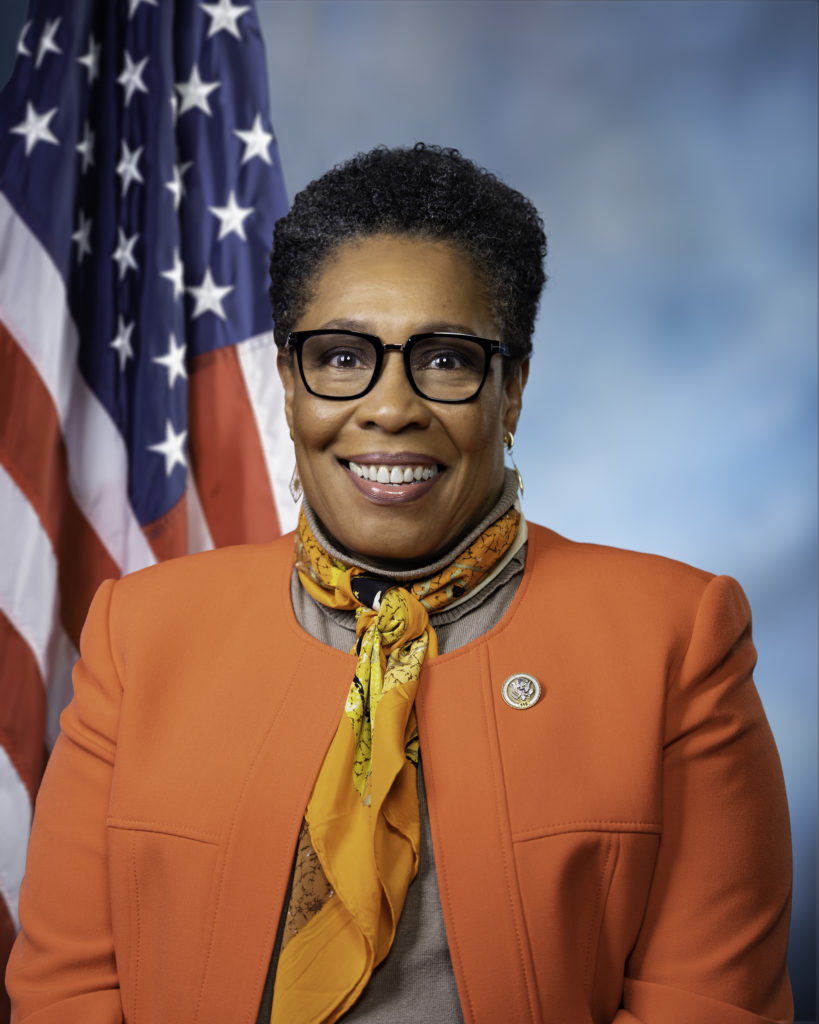
Marcia Fudge confirmed: The Senate confirmed Congresswoman Marcia Fudge (D-OH) as Secretary of Housing and Urban Development with a 66-34 vote. The confirmation makes Congresswoman Fudge the first Black woman to lead HUD in more than four decades.
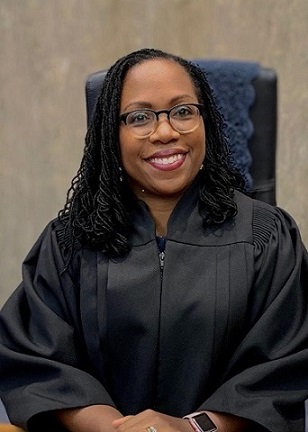
Buzzfeed reports Biden may nominate U.S. District Judge Ketanji Brown Jackson for the D.C. Circuit of the U.S. Court of Appeals: If nominated and confirmed, Judge Jackson would be the third Black woman to serve on the court, which is overwhelmingly filled with white men. She previously served as a Vice Chair and Commissioner on the United States Sentencing Commision and has clerked for three federal judges, including U.S. Supreme Court Justice Stephen Breyer. Her nomination to the D.C. Circuit would advance the prospects that she could later be nominated to serve on the U.S. Supreme Court, as 5 of the current 9 U.S. Supreme Court Justices previously served on the D.C. Circuit. In February, the Joint Center urged President Biden to prioritize Black appointments to the U.S. Court of Appeals, as none of President Trump’s 54 appellate court nominations were Black, and 10 of the 18 active Black U.S. Appellate Court judges are currently eligible to retire.
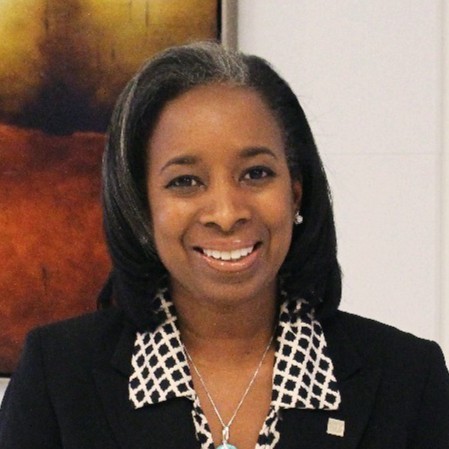
Biden appoints Peggy Delinois Hamilton as General Counsel at the Small Business Administration (SBA). Ms. Hamilton currently serves as the Vice-Chair In-House Counsel Subcommittee, Banking Law Committee, Business Law Section for the American Bar Association.

Biden appoints Eyang Garrison as Chief of Staff in the Office of the Deputy Secretary at the Department of Agriculture. Ms. Eyang previously served as the Deputy Chief of Staff and Legislative Director to Congresswoman Marcia L. Fudge. She has held various positions at USDA such as a Program Analyst for the Food and Nutrition Service and as a Legislative Analyst in the Office of Congressional Relations.

James Arthur Jemison appointed Principal Deputy Assistant Secretary in the Office of Community, Planning and Development at the Department of Housing and Urban Development. Mr. Jemison previously served as the Group Executive for Planning Housing & Development for the City of Detroit, Michigan. He has prior experience serving as the Deputy Undersecretary and Deputy Director for the Department of Housing and Community Development for the Commonwealth of Massachusetts.

Alanna McCargo appointed as Senior Advisor for Housing Finance at the Department of Housing and Urban Development. Ms. McCargo previously served as the Vice President of the Housing Finance Policy Center at the Urban Institute. She has also led nonprofit boards such as Doorways for Women & Families and The Women in Housing and Finance.

Peggy Bailey appointed as Senior Advisor for Rental Assistance at the Department of Housing and Urban Development. Ms. Bailey previously served as the Vice President for Housing Policy at the Center on Budget and Policy Priorities.
Economic Policy
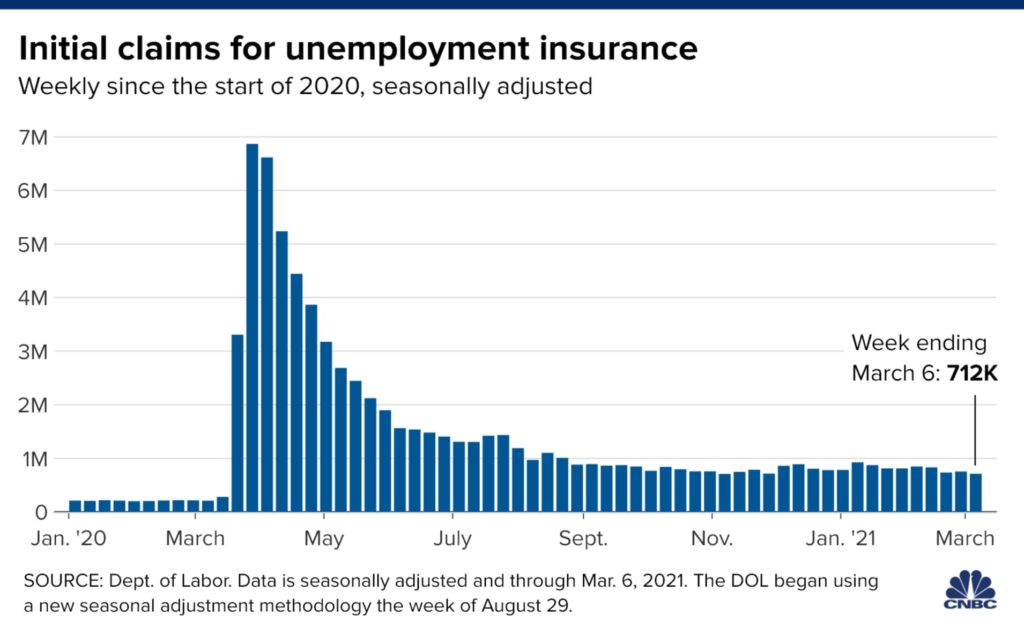
Jobs barely budge: First time unemployment claims remain high at 712,000 for the week ending March 6, still higher than the pre-pandemic record of 695,000 set in 1982.
Shuttered stores: Black-owned businesses are struggling to recover from the pandemic. According to the National Bureau of Economic Research, Black-owned enterprises closed at more than twice the rate of white-owned businesses in early 2020.
Slow down, be safe: In a bid to protect worker safety, Sen. Cory Booker (D-NJ) and Reps. Rosa DeLauro (D-CT) and Bennie Thompson (D-MS) plan to reintroduce legislation to curb rising speeds in processing lines at meat and poultry plants, which have also been significant coronavirus hotspots. Black people make up 21.9 percent of all animal slaughtering and processing workers.
COVID PTSD: Frontline health care workers and caregivers are coping with understaffing, stress, and the traumatic deaths of relatives and coworkers because of the pandemic. They are also often paid low wages and lack health insurance. People of color represent approximately 40 percent of the healthcare workforce.
Taxing decisions: State and local tax policies can either mitigate or exacerbate racial inequities amplified by the COVID-19 pandemic, the Urban Institute finds.
It’s who you know: Race is the most important differentiator in social networks’ role in economic mobility, new research finds. In four cities, Black men had the least developed networks to secure jobs, education, and housing. Recommendations include desegregating communities and changing policies that undermine the ability of Black boys and men to establish strong social networks.
Help (not) wanted: Racism and access are major barriers to Black people finding jobs in Louisiana. Black workers there were 2.7 times more likely to be unemployed during the pandemic than white workers, according to Step Up Louisiana.
Amazon Local 1: An Amazon warehouse in Bessemer, AL, 15 miles south of Birmingham, is the site of an unprecedented unionization effort, with more than 2,000 workers signing cards in support of a union election.
Tech Policy
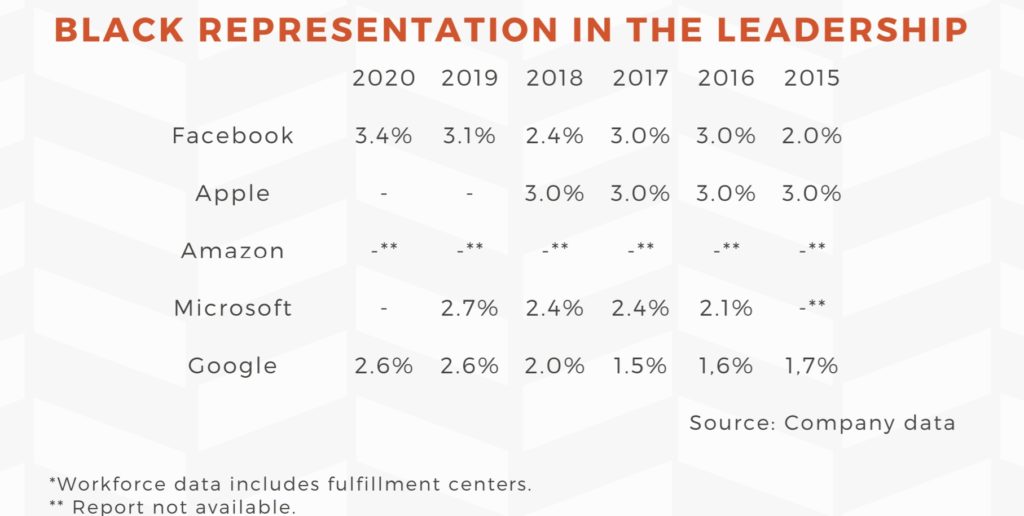
Black tech inching higher: The Congressional Black Caucus released its five-year Tech 2020 report, aimed at increasing African American inclusion in the tech industry (graph above). The Level Playing Field Institute estimated that there would be up to 70 percent of 1.4 million tech jobs unfilled in 2020. From 2015 to 2020, major tech companies made modest progress in hiring Black workers.
Expanding broadband access: House and Senate Democrats proposed a $94 billion bill to lessen disparities in access to broadband, which were magnified during the coronavirus pandemic. The proposal by Rep. James E. Clyburn (D-SC) and Sen. Amy Klobuchar (D-MN) aims to expand internet services to underserved areas, improve connectivity speeds, and increase affordability.
Paving the way for public broadband: Another bill expands broadband access by eliminating barriers to public-private partnerships in local broadband systems. State laws that prohibit or create obstacles for municipal broadband networks limit the ability to connect more Americans. The bill, introduced by Sen. Cory Booker (D-NJ) and Reps. Anna G. Eshoo (D-CA) and Jared Golden (D-ME), would encourage more municipal broadband networks in underserved rural and urban communities. The legislation would nullify state laws prohibiting local governments from building their own broadband systems.
It’ll take more than subsidies: Public subsidies for broadband may not be enough to counter prohibitively high subscriber fees in sparsely populated areas, putting broadband out of reach for many, new research finds. Fewer than 70 percent of rural residents had access to broadband, whereas more than 90 percent of all Americans had access in 2015.
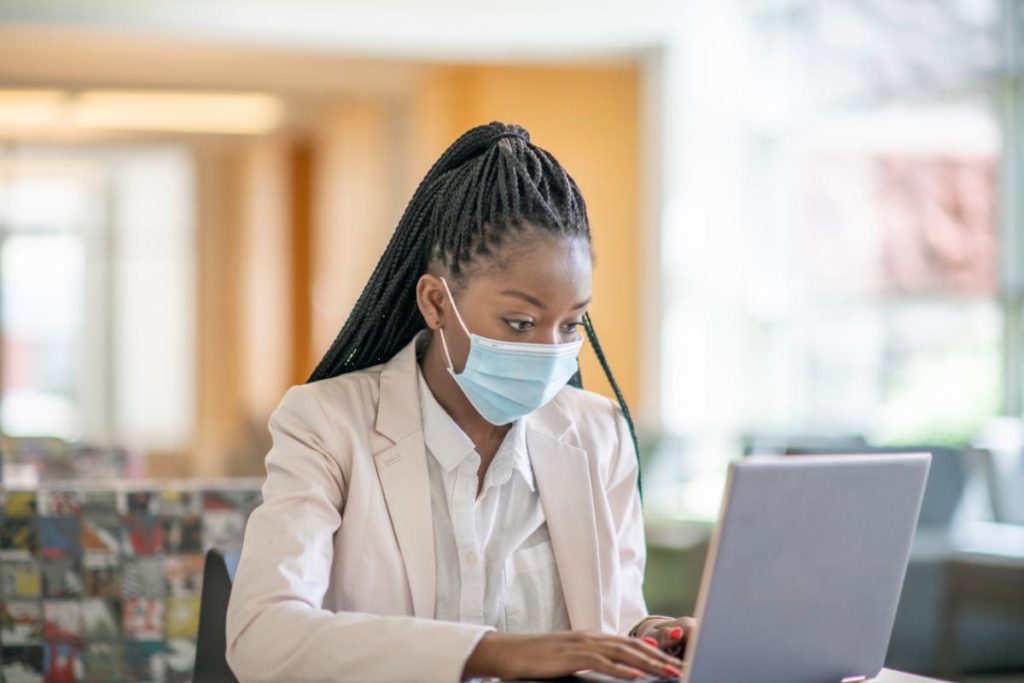
Help where it’s needed: The FCC’s emergency internet subsidy program for low-income households should prove more helpful to low-income households of color, according to a new survey. Twenty-seven percent of nonwhite adults who make less than $50,000 annually said they have missed an internet payment in the past year versus only 16 percent of lower-income white adults.
“Zonecasting” under fire: Advocates argue that an FCC proposal to permit geo-targeted advertising on FM radio stations could undermine policies addressing discriminatory redlining practices in Black and other communities of color.
I saw it on Facebook: Misinformation and conspiracy theories circulating on social media are sowing distrust of and resistance to COVID-19 vaccinations in Black communities, compounding the existing wariness arising from a history of medical abuse and exploitation.
AI for AI bias: As artificial intelligence in hiring practices becomes more prevalent, the Brookings Institution explores the option of auditing algorithms to detect discrimination. Speech pattern models can discriminate against African Americans, while facial recognition analysis struggles with skin color.
Smile, you’re on camera: California civil rights groups filed suit against one of the largest facial recognition databases in the U.S. for continuing to stockpile images and use algorithms to identify people in pictures scraped from social media sites and apps, including Facebook and Venmo. A 2019 federal study showed that Black people are about 100 times more likely to be misidentified by facial recognition technology than white people.
Undermining the FHA: The Trump administration’s disparate impact rule could create complications for plaintiffs in Fair Housing Act cases involving algorithmic discrimination, according to lawyers. The disparate impact rule is an important corrective tool to challenge discriminatory harms of big data in employment, housing, and lending.
Future of Work & Learning
How much is too much college debt? Limiting student debt forgiveness to $10,000, as President Biden has proposed, fails to account for the racial wealth gap, argues Brookings Institution fellow Andre Perry. Black median family wealth was $17,600 versus $171,000 for whites in 2016.
Online career training, for some: The Urban Institute offers strategies to address structural inequality resulting from the shift to online education in postsecondary and technical schools due to COVID-19.
Job automation’s heavy toll: Workforce training and education must be updated to reduce the toll of job automation on Black and Latina/o workers, say experts at Brookings. Workers of color are at greater risk for job loss due to automation than white workers. Jobs with the least risk of automation employ 11.6 percent of the Black workforce and 14.5 percent of the white workforce, while those at highest risk of automation employ 24 percent of the Black workforce and 23 percent of the white workforce.
Digital passports could open more doors: Community-based organizations can help in building systems that enable individuals to share digital learning and employment records with schools, employers, and training programs, which can help make the job market more equitable for underserved communities.
COVID-19
Vaccine disparities persist: The national COVID-19 vaccine rollout is still not equitably distributed in Black communities. White people are vaccinated at twice the rate of Black people, according to a March 1 study.
Not good enough: The rollout of Johnson & Johnson’s single-dose coronavirus vaccine is leading some Black people to wonder whether it is another form of subtle racism given that the vaccine has lower efficacy than two-dose vaccines.
Two-thirds are willing and waiting, literally: Lack of access to vaccines, not resistance to taking it, is a larger factor in the lower vaccination rates in Black communities, say Rep. Karen Bass (D-CA), National Urban League CEO Marc Morial, and Cheryl Grills, a clinical psychologist. A new poll shows that 67 percent of Black people are willing to take the vaccine.
Churches ask for vaccines: Black clergy members and church leaders are hosting COVID-19 testing and vaccination clinics in an effort to mitigate shortfalls in vaccine availability in Black communities.
A social vulnerability index: Wrestling with how to equitably distribute the COVID-19 vaccine, officials in Michigan turn to the CDC’s social vulnerability index. Black citizens make up 21 percent of COVID-19 deaths but only 14 percent of the state’s residents.
“How can this disparity exist?” In Alabama, white residents have received 54.6 percent of the COVID-19 vaccinations while Black residents have received only 14.6 percent. The first doses of vaccines in the state went to an affluent white suburb of Birmingham while a health clinic in a nearby mostly Black, low-income neighborhood had yet to administer a dose as of March 8.
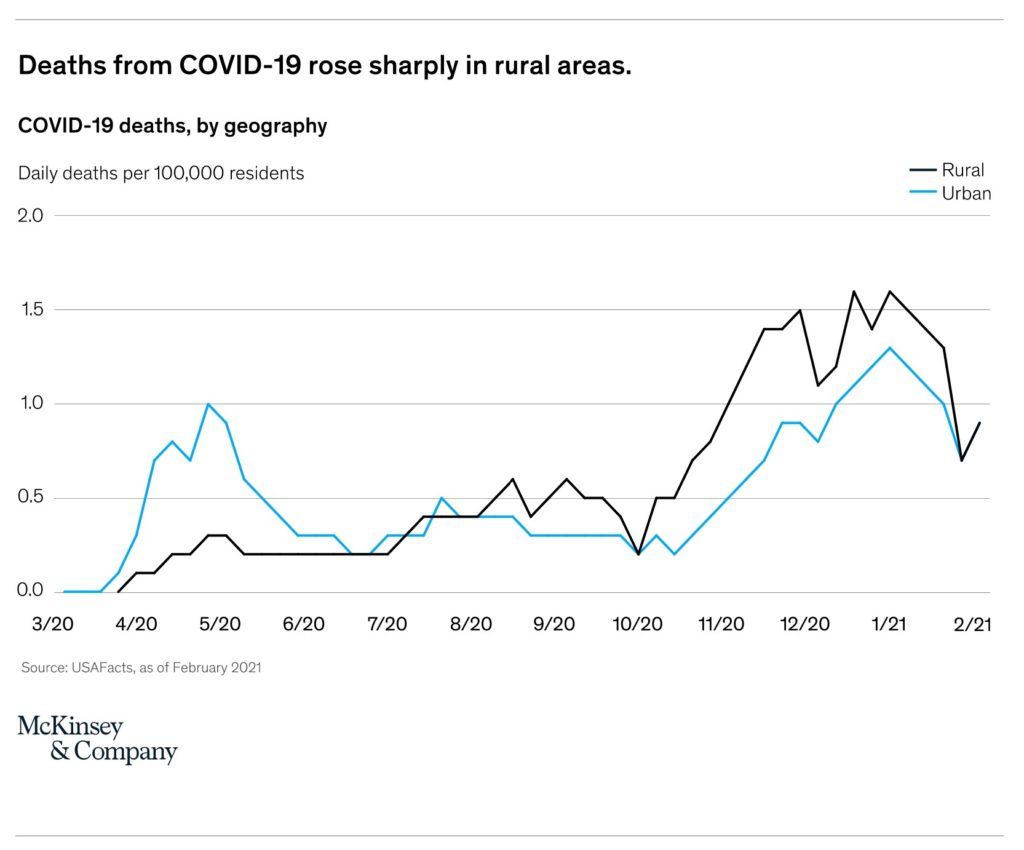
Rural areas see faster spread: COVID-19 is spreading more rapidly in rural than urban communities, a McKinsey study finds, with Black and other communities of color at greater risk of hospitalization and death. Nationally, Black mortality rates are 185 per 100,000 individuals.
Getting by on a lot less: A new poll shows that Black people are more likely than white people to have lost a job or income due to the economic fallout of COVID-19. 24 percent of African Americans reported a loss in household income had a major impact on their current financial situation compared to 12 percent of white people.
COVID was good to billionaires: Income inequality widened as America’s billionaires saw their wealth grow by 44 percent in 2020. Meanwhile weekly jobless claims still outpace past recessions. The jobless rate by February 2021 had fallen to 5.6 percent for white people but was nearly double (9.9 percent) for Black people.
Safety first: Complications are growing in reopening schools as parents weigh the health risks against the negative repercussions of remote learning. Black parents are more likely than other groups to prioritize safety concerns and vaccination before opening schools.
Political Studies
March 15 report card on top staff diversity of newly-elected Members: As of March 15, the Joint Center’s report card tracking top staff hires by each new Member in the 117th Congress illustrates that 208 of 213 (or 97.7 percent) of the possible positions have already been filled. Of Members who have hired all three top staff positions, so far Alex Padilla (D-CA) leads in the Senate and Marilyn Strickland (D-WA) leads in the House for hiring diverse staff in comparison to the diversity of their districts or states. Those at the bottom of the lists are Senator Mark Kelly (D-AZ) and Rep. Yvette Herrell (R-NM). Of the top staff hired by new Members, so far 25 percent are people of color, and 5.8 percent are African American. People of color account for 40 percent of the U.S. population and African Americans account for 13.4 percent of the U.S.
Staff diversity still lags on the Hill: Slate cites Joint Center research in exploring why congressional staffers are largely white. Despite record diversity in Congress, people of color hold only 11 percent of Senate and 14 percent of House top staff positions.
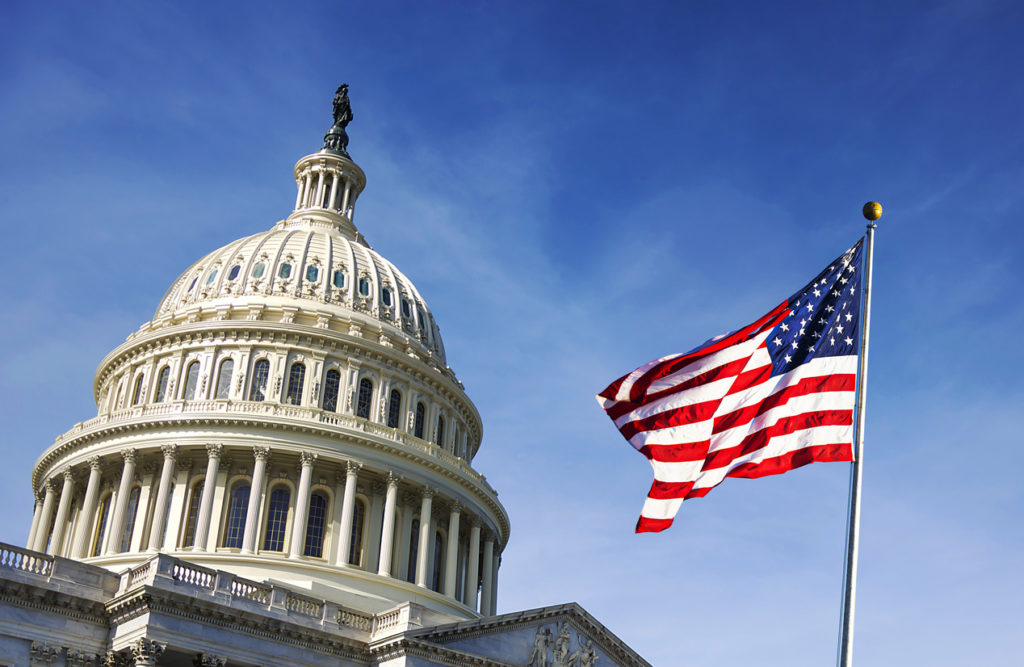
Making internships possible: Allowing more remote congressional internships is one way to increase diversity on Capitol Hill, says Congresswoman Pramila Jayapal (D-WA). A 2019 study found that among House of Representative interns, only 13 percent were Black while 67 percent were white.
Bottom up change: A group of about 1,000 congressional aides, including those represented by the Congressional Black Associates, is pushing for a safer environment, better working conditions, counseling, and other services in the wake of the Jan. 6 Capitol Hill riot.
Depressing the Black vote: New voter restrictions in Georgia, including on voting by mail and voting on Sundays, will hurt Black voters most. The share of Black Georgians voting by mail has been rising steadily since 2016 but falling for white voters. In 2020, nearly 30 percent of Black Georgians cast their vote by mail versus around 24 percent of white voters.
Voting down the filibuster: Sen. Raphael Warnock (D-GA) says it may require eliminating the filibuster to pass legislation to counter the proposed voter restrictions in Georgia and nationally. The Senate filibuster rule requires a 60 percent supermajority to pass legislation.
Movement Building
Black Futures Lab creates an infographic drawing awareness to the harmful impacts of air pollution, noting the disparity of exposure between Black and white people.
Black Lives Matter Birmingham leads a solidarity caravan in Bessemer, AL alongside the NAACP, Southern Leadership Christian Conference, Civil Rights Foot Soldiers, Poor People’s Campaign, Concerned Clergy, and other Black led organizations in support of unionization for Amazon workers.
Black to the Future Action Fund hosts a “Black Mandate” text bank to demand Congress and the Biden administration take action and provide relief for Black communities through economic justice, climate justice, racial justice, and COVID-19 protections.
Color of Change partners with the National Council for Incarcerated and Formerly Incarcerated Women and Girls to issue a petition demanding President Biden to grant clemency to 100 Black women who “are elderly, seriously or terminally ill, or served over 10 years in federal custody.”
Events
Upcoming events include “Essential workers: One year into the COVID-19 pandemic” (Brookings Institution, March 18); “What a Biden-Harris Administration Means for HBCUs: A conversation with HBCU leaders” (Deloitte and Lumina Foundation, March 18); “Post-COVID Transportation Planning” (REMI, March 18); “Promoting Equitable COVID-19 Vaccine Distribution in the Greater DC Region” (Urban Institute, March 23); “Here to Stay: Black, Latina, and Afri-Latina Women in Construction Trades Apprenticeships and Employment” (Institute for Women’s Policy Research & Chicago Women in the Trades, March 25); “Sojourner Truth Legacy Project Virtual Program: Celebrating the Rise in Black Women Political Leadership” (Congressional Black Caucus Foundation, March 30).
Last week, events were held by the Brookings Institution, Economic Policy Institute, Knight Foundation, and Politico.
Podcasts
The Post-Pandemic University (Future U)
Ep. 40: Higher Ed’s New Digital Divide (Inside Higher Ed)
The Joint Center thanks the Annie E. Casey Foundation, the Boulé Foundation, the Democracy Fund, Toyota Motor North America, Inc., UPS, and the Walmart Foundation for additional support that has allowed us to do some of our COVID-19 and Black Communities work.
To receive the Joint Center’s emails, sign-up here.

